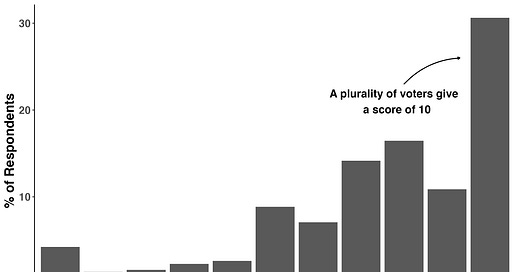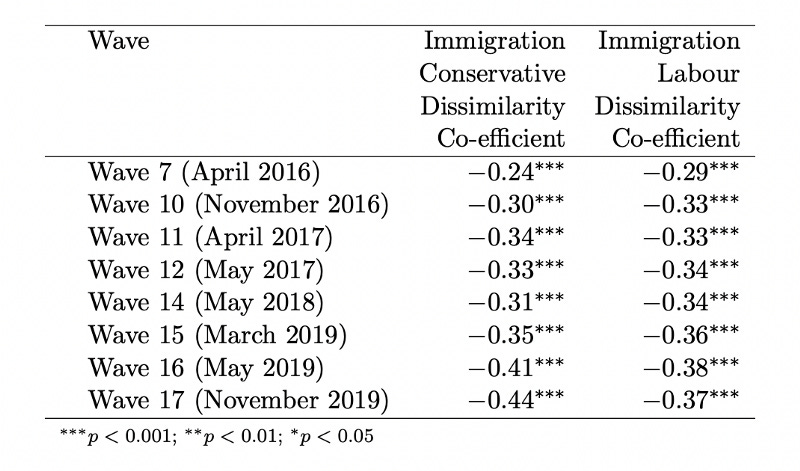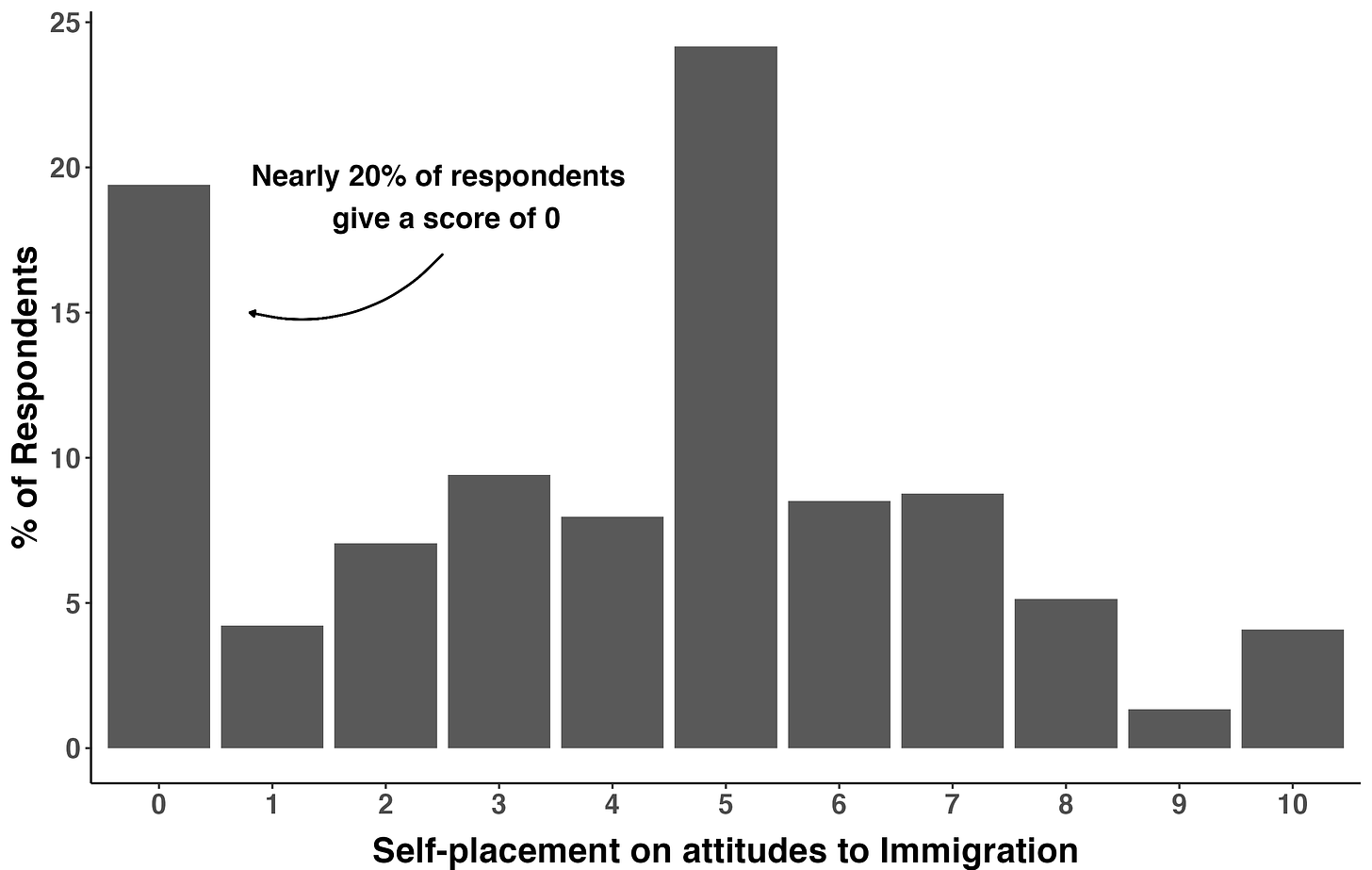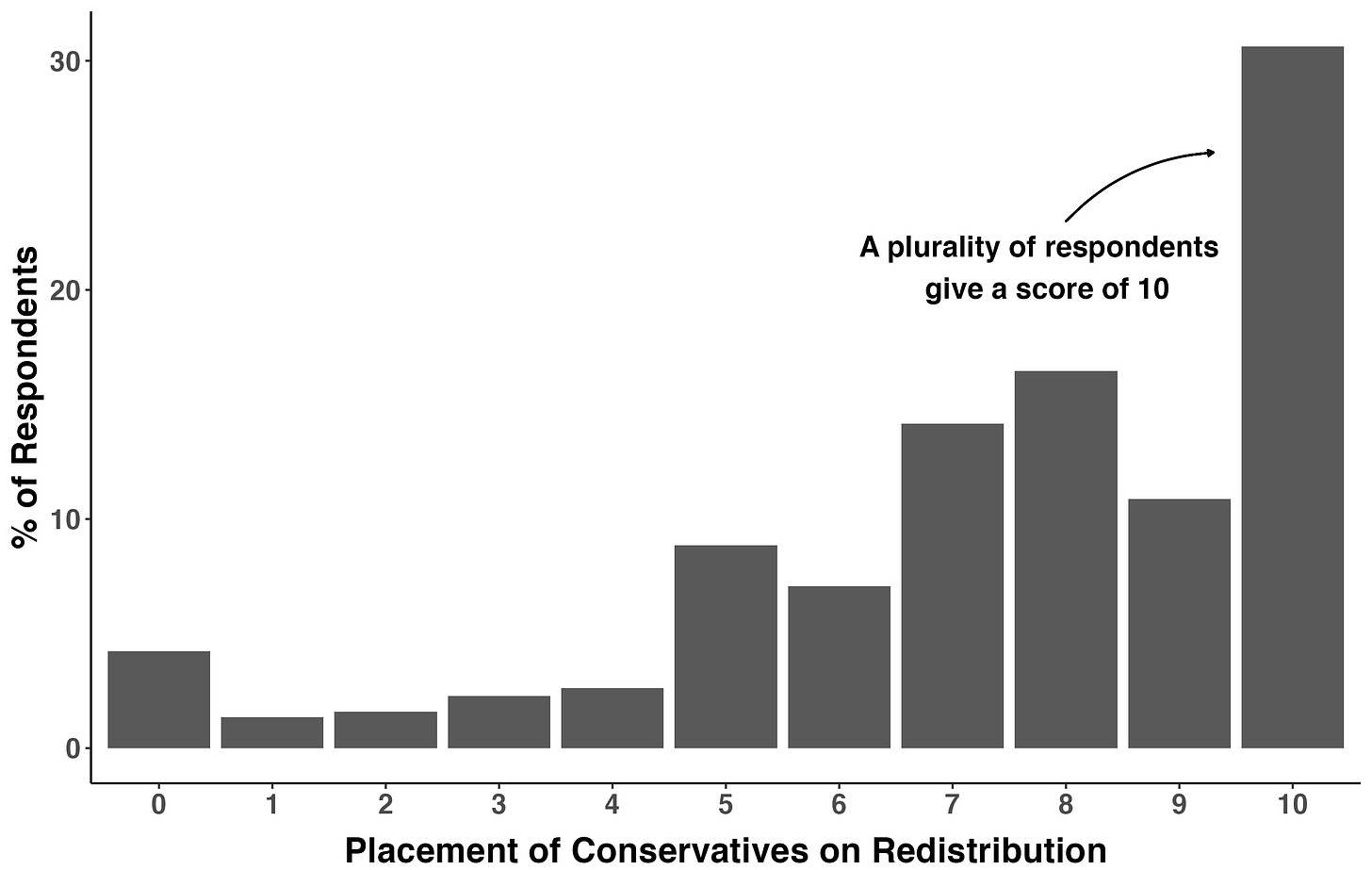Most of the stuff I’m about to say is pretty obvious, and I think most people who think about politics and elections are aware of most (if not all) of it, but I thought it would be interesting to jot down some thoughts on why things are going badly for Labour and what exactly needs to change for them to do better in the next election. One reason that Labour did badly in the last election and continues to do badly in the polls is the increased importance of cultural issues (read: Brexit and immigration) relative to economic and material issues in determining how people vote. The table above shows (sorry, this part is slightly jargony) the extent to which the negative correlation between holding a different view to a party on immigration and the likelihood of voting for that party has increased substantially between 2016 and 2019 — that is to say, if I believe that my views on immigration are different to Labour’s views on immigration, that is more likely to make me refuse to vote for Labour than was the case in 2016 (and the same is true of the Conservatives). To put it simply, immigration mattered a lot more in the 2019 election than it did in the 2017 election in determining how people voted.
The increased salience of immigration is bad for Labour because most people prefer the Conservatives on immigration to Labour — data from Wave 20 of the British Election Study shows that about 39% of voters think that the Conservatives will be able to reduce immigration, whereas only about 6% of voters think that Labour will be able to reduce immigration. The obvious retort here is that not all voters think that reducing immigration is a good thing, which is true, but the average voter does want to reduce immigration — when asked to place themselves on a scale between 0 and 10, with 0 being the view ‘we should allow many fewer immigrants’ and 10 being the view ‘we should allow many more immigrants’, the average score is a 4. Note though, that the reason that the average score is a 4 is not that most people put themselves at around a 4, but that there are basically two especially popular positions on immigration: either you put yourself at around a 5, indicating being fairly neutral (or thinking immigration levels should stay around the same), or you are really, really opposed to immigration and think it should be reduced substantially (see above for the distribution of answers).
So, what about other issues? Well, most people in the UK are fairly supportive of Labour on tax/spend and on redistribution. Like with immigration, the British Election Study asks respondents to place both themselves and the parties on a scale showing their views on redistribution and their views on tax/spend. The average difference between a respondent and Labour on their views on tax/spend (the dissimilarity between the two parties) is about 2.1, whereas the same figure for the dissimilarity between the average respondent and the Conservatives is about 3. Perhaps most notably is the extent to which voters think the Conservatives are opposed to redistribution — when asked how the Conservative Party sees redistribution (with 0 being the view that government should try to make incomes more equal and 10 being that government should be less concerned with making incomes more equal), the mean score is about 7.4, indicating that voters think the Conservatives are very anti-redistribution (the distribution of answers can be seen above, many people give the Conservatives a score of 10). In contrast, the voters themselves are mildly supportive of redistribution, with the mean self-placement score being 4.6.
Perhaps even more encouraging for Labour are the answers on tax/spend — voters are much closer to Labour on whether taxes should be higher and social services should receive more funding than they are to the Conservatives — when asked about whether the government should tax more and spend more or tax less and spend less (with 10 indicating much more and 1 indicating much less), the mean self-placement is 6.4, and the mean placements of Labour and the Conservatives are 7.1 and 4.3 respectively. Basically, people are actually pretty supportive of higher taxes and higher spending, and they view Labour as holding a fairly similar position to themselves.
So, people mostly think they are more similar to the Conservatives on the issue of immigration, but more similar to Labour on redistribution and on tax/spend. But which party do people think is best on the most important issue? And by the most important issue, I’m not talking about some specific issue I think is particularly important, but whichever issue a given respondent identifies as the most important. Well, 32% of respondents think that the Conservatives are best suited at handling whatever they think the most important issue is, whereas only 20% of voters think that Labour are the best suited to handling it. This is a problem — even though voters agree with Labour on redistribution, and they agree with Labour on tax/spend, a substantially larger number of voters think that the Conservatives would be better handling whatever the most important issue is.
This isn’t likely to be a COVID effect — respondents were asked how well they thought the Conservatives were doing at handling the pandemic, and the mean response was to give them a 2.5 out of 10. They were also asked how they thought Labour would do if they were in government, and gave them a 2.6 out of 10 — not much better, but indicates that it probably isn’t the case that most voters saying the Tories are better on the most important issue is because of how they’ve handled the pandemic. Another interesting thing on COVID is that voters place themselves much closer to Labour on how they think the pandemic ought to be handled. When asked how they think the balance should be struck between controlling COVID and allowing the economy to prosper, with 1 being ‘Reduce infections even if it damages the economy’ and 10 being ‘Save the economy even if it increases infections’, the mean self-placement score 3.4, whereas the mean scores for Labour and the Conservatives are 3.8 and 6.6 (!) respectively. So, most voters feel strongly that protecting lives is more important than protecting the economy, and also take the view that both parties are prioritising the economy too much, but that is much more true of the Conservatives than it is of Labour. One caveat to these findings is that they are from 2020 before the vaccine roll-out, so opinions may have changed in the last few months.
The key task for Labour, then, is to increase the extent to which dissimilarity on tax/spend and redistribution impacts electoral behaviour, and decrease the extent to which Immigration does. There are a few reasons to be optimistic here: with Brexit sort of over (okay, not quite, but you know what I mean), the salience of both immigration and Brexit are likely to fall. If this results in economic and material issues having more of an effect on voting behaviour, Labour are likely to do better. The effect of COVID is also likely to make the salience of the NHS much higher, which could be good for Labour if the Conservatives do not receive a long-term vaccine boost and if Johnson’s pledge to build many more hospitals and level up the NHS hasn’t neutralised Labour on healthcare.
There’s also a case that Labour can really begin to push the narrative of the Conservatives failing on COVID in the aftermath of the pandemic: it’s pretty clear from the data that the public think that the Conservatives wrongly prioritised the economy over saving lives, and while it may come across as opportunistic to highlight this during the pandemic, the aftermath may provide an opportunity for Starmer to make more explicit criticism of how lockdown was handled. For a few reasons, I think Labour are undervalued at the moment — government poll leads, local election results, and the results in Hartlepool have given the impression that Labour are useless, and while Starmer has been a lacklustre leader, the vaccine boost is almost definitely a big factor why the Tories have performed well in the last few electoral tests for the party. If the salience of cultural issues decreases towards the next election, Labour are able to place the blame for poor pandemic management at the feet of the government, and Starmer can close some of the gap on personal ratings between himself and Johnson (or is replaced by someone with better ratings), Labour could be in with a shot.







That was quite interesting. I came here via your comment on DC's Substack.